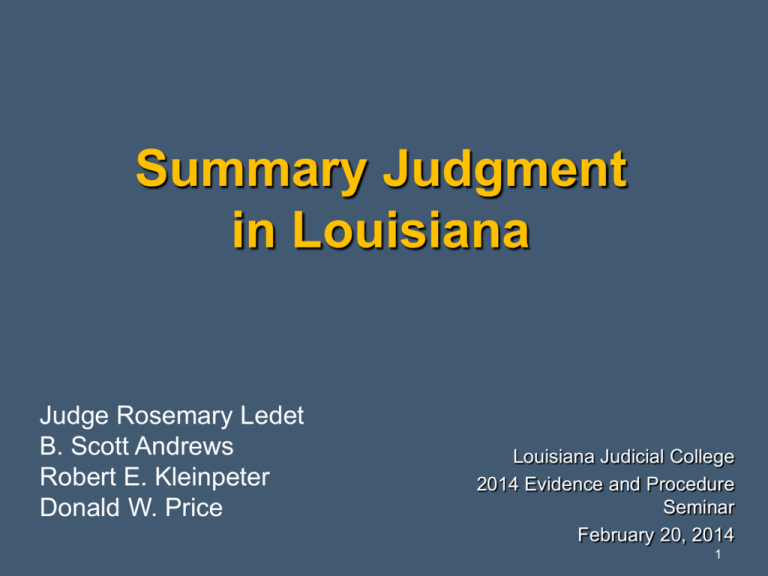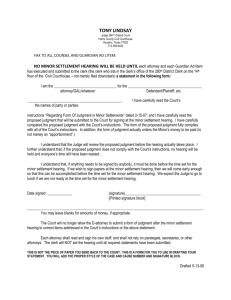View Power Point
advertisement

Summary Judgment in Louisiana Judge Rosemary Ledet B. Scott Andrews Robert E. Kleinpeter Donald W. Price Louisiana Judicial College 2014 Evidence and Procedure Seminar February 20, 2014 1 Summary Judgment An Historical Perspective 2 Rule 56 of FRCP In 1938, the federal rules created a summary judgment process: • applied to “all actions …” • “a method for promptly disposing of actions in which there is no genuine issue of material fact” 3 The Initial Federal Court Approach For many decades after 1938: • Summary judgment was the exception, not the rule • Courts were expected to be tougher on the movants than on the parties resisting summary judgment 4 The 1960 Code of Civil Procedure • Included a procedure for summary judgment • Official comments observed it “will not be successfully utilized often” but the device “should go very far in discouraging [frivolous] demands and defenses.” • Unavailable in certain family law cases • No partial summary judgment 5 Louisiana Judicial Response to Summary Judgment • “Appropriate to consider federal jurisprudence” – Kay v. Carter • Any doubt must be resolved against the motion • Burden on the mover was “strict” • Not appropriate for the determination of subjective or complex facts 6 1986 Rulings of the United States Supreme Court Summary judgment was granted: • In Matsushita, where there could be no inference of conspiracy • In Anderson, where the court equated the issue on a MSJ to that on directed verdict • In Celotex, burden of proof bearer must establish the existence of a triable factual issue on that element 7 The CCP 1996 and 1997 Amendments • Summary judgment is “favored” • Burden of production of evidence on party who bears burden of proof • Must be ruled on at least 10 days before trial • Allowed even though it does not dispose of the case • Evidence to be scrutinized equally, removes trial presumption 8 Subsequent Developments I • Greater use of MSJ • Expert testimony must be considered if it would be admissible at trial • Times for serving attachments and filing opposition papers are mandatory • MSJ shall be rendered “only as to those issues set forth in the motion before the court” 9 Subsequent Developments II • If the court determines “that a party or nonparty is not negligent … or did not cause, … the injury or harm alleged, that party or nonparty may not be considered in any subsequent allocation of fault.” [excepting 1005]. • Only evidence admitted for the MSJ shall be considered by the court • Trial court must provide reasons for denial of MSJ • In 2013, all attachments to, or opposing, the MSJ are deemed admitted into evidence 10 Amendments to Art. 966 Act 36 of 1966 Act 101 of 1983 Act 89 of 1984 Act 71 of 1992 Act 9 of 1996 Act 483 of 1997 Act 771 of 2001 Act 867 of 2003 Act 690 of 2010 Act 257 of 2012 Act 741 of 2012 Act 391 of 2013 11 Current Procedure 12 Preliminary Notes • Summary judgment may be rendered only as to the issues set forth in the Motion, and only admitted evidence may be considered by the court. • MSJ can be filed by Plaintiff after Defendant has answered, and by Defendant at any time. • Court shall render judgment within a reasonable time, and at least 10 days before trial. 13 Before the Hearing Motion has attached Order and states: (1) Whether or not the case is set for trial and, if so, the trial date; and (2) That no testimony will be offered at the hearing. District Court Rule 9.8 14 Before the Hearing Motion specifies the particular issue, theory of recovery, cause of action, or defense for which summary judgment is requested. 15 Before the Hearing Supporting Memo contains: • • • List of essential legal elements necessary for the mover to win; List of material facts the mover contends are not genuinely disputed; and Reference to the document proving each undisputed fact, with the pertinent part designated. District Court Rule 9.10 16 Before the Hearing Supporting documents are cited in and attached to the Motion. 17 Before the Hearing Motion, Supporting Memo, and Attachments are furnished to trial judge and served (by sheriff) on all parties at least 15 calendar days before the hearing. District Court Rule 9.9 18 Before the Hearing Opposing Memo contains: • List of material facts the opponent contends are genuinely disputed; and • Reference to the document proving each undisputed fact, with the pertinent part designated. District Court Rule 9.10 19 Before the Hearing Attachments to the Motion and Attachments to the filed Opposing Memo will be deemed admitted for purposes of the MSJ, unless excluded in response to an objection: • • Raise objection in the opposing/reply memo OR Raise objection in a written motion to strike 20 Before the Hearing Opposing Memo and Attachments are furnished to trial judge and served (by mail, delivery, or electronic means) on all parties at least 8 calendar days before the hearing. District Court Rule 9.9 21 Before the Hearing Reply Memo is furnished to trial judge and served (by mail, delivery, or electronic means) on all parties by 4:00 p.m. on the day that is two week days before the hearing. District Court Rule 9.9 22 At the Hearing Mover: formally introduce any evidence that is filed in the suit record but not attached to the Motion. 23 At the Hearing Opponent: either file the Opposing Memo and Attachments before the hearing, or formally introduce the Attachments into evidence at the hearing. 24 After the Hearing If motion is denied and no oral or written reasons provided, request written reasons within 10 days of the denial. 25 Summary Judgment Overview 26 Purpose To secure the just, speedy, and inexpensive determination of every action, except those disallowed by Article 969. 27 Standard Must be granted when: • • No genuine issues of material fact exist and the mover is entitled to judgment as a matter of law OR Opposing party fails to sufficiently prove the existence of an element essential to the claim, action, or defense on which he or she bears the burden of proof 28 Partial Motion for Summary Judgment A court has authority to grant a partial summary judgment to dispose of “a particular issue, theory of recovery, cause of action, or defense.” 29 Burden of Proof Movant: Produce evidence (i.e., affidavits, discovery responses) to prove essential element of case; or, point out lack of factual support for an essential element in opponent’s case for which opponent will bear the burden of proof at trial. Opponent: Produce evidence which shows he will be able to meet burden of proof at trial 30 Material Factual Issues Facts are considered “material” when they: (1) (2) (3) Potentially ensure or preclude recovery; Affect the litigant’s ultimate success; or Determine the outcome of the legal dispute. 31 Genuine Factual Issues A “genuine” issue is a “triable” issue if reasonable persons could disagree. 32 Discovery A trial court has discretion to issue a summary judgment or to require further discovery. 33 Admission of Evidence A court may consider the following evidence when deciding a motion for summary judgment: • • • • • Pleadings Depositions Answers to Interrogatories Admissions Affidavits 34 Pleadings: General Rule: Allegations contained in a party’s pleadings are insufficient to defeat a motion for summary judgment. 35 Depositions: Deposition testimony not based on personal knowledge of the person giving the deposition does not meet the legal requirements and should not be considered. 36 Affidavits I: Affidavits containing factual statements must meet the standard for admissibility at trial. Admissibility can be challenged by: (1) (2) (3) Daubert hearing; Motion to strike; or Counter affidavits. 37 Affidavits II: At a hearing, the trial judge may admit an affidavit into evidence, consider it, and then decide it does not meet the test of article 967(A). See Lewis v. Four Corners Volunteer Fire Dep’t, 2008-0354 (La. App. 1st Cir. 9/26/08), 994 So. 2d 696 38 Documents: A document that is neither an affidavit nor sworn to in any way, and/or that is neither certified or attached to an affidavit, is not of sufficient evidentiary quality to be given weight on summary judgment. La. C.C.P. Art. 967 39 Credibility • Credibility determinations and the weighing of conflicting factual evidence has no place in deciding a motion for summary judgment • If determination of the motion depends on subjective facts such as intent, motive, knowledge, or good faith, a trial court should rarely, if ever, grant a motion for summary judgment 40 Inferences Must be viewed in the light most favorable to the opposing party 41 Appellate Review Appellate courts review summary judgments de novo, using the same criteria that govern trial court consideration, and must reverse the granting of a summary judgment if: • Genuine issues of material fact exist; and • Movant is not entitled to judgment as a matter of law. 42 Concluding Remarks 43






